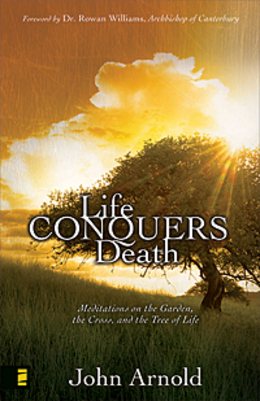Archbishop of Canterbury's Lent Book 2008
 Life Conquers Death, by John Arnold
Life Conquers Death, by John ArnoldWednesday 6th February 2008
The Archbishop's Foreword for this year's Lent Book.The History behind the Lent Book
Archbishops of Canterbury have commissioned an 'Archbishop of Canterbury's Lent Book' for decades, collaborating with a Christian publisher. The books concentrate on theological or devotional Christian themes relevant to Lent, in preparation for the celebration of the passion and resurrection of Jesus Christ in Holy Week and Easter. The Archbishop commissions the author, and always writes the foreword.
This year the Lent Book is "Life Conquers Death" by the Very Revd John Arnold, former Dean of Durham, and the present publisher is Zondervan (US).
The foreword by the Archbishop of Canterbury follows:
Foreword
John Arnold once said that he had learned Russian during his military service, as part of a process of equipping him for conflict during the Cold War era; but that what his knowledge of Russian had done was to equip him instead for a lifetime of friendship and understanding. He had never, he said, uttered a word of Russian in anger. It is a very apt parable for the way in which God overrules human suspicion and human conflict to draw his own purposes gently through.
This book is the fruit of a long absorption in the riches of the Christian tradition, East and West, and its subject matter is nothing less than the great central theme of redemption, treated with a fullness of classical theological sensitivity. But it also represents that lifetime of listening to and loving the heritage of Russia in particular – the great twentieth century testimonies to hope and human dignity out of the heart of terrible suffering. Writers like Pasternak and Solzhenitsyn show, without any evasion or sentimentality, how the beauty of the human face can show itself in the most apparently inhuman of places. And John Arnold's superb meditations on these stories and testimonies lead directly into meditation on the gospel narratives that lie behind them and make full sense of them.
God has chosen to redeem us and restore our humanity by nothing less than his own journey into the wars and gulags and inner mental prisons where human beings try to blot out the image of God in themselves and each other. The face of glory has to be allowed to come to light in the heart of the darkness; if it were only a slightly improved version of the best we can do, we should have no compelling reason to see it as God's face. It is when it appears in the depth of greatest despair and inhumanity that it shows its true and indestructible power.
With that vision in our hearts and minds, we can, as John Arnold urges, take up again the task of humanising our own environment – our built environment with all its social tragedies and traumas, but also our whole material environment, symbolised in these pages by the recurring image of the tree of life.
This book is a powerful statement of basic Christian hope; I asked John to write it after hearing him deliver two retreats in which I felt that I had been introduced afresh, with authority and profundity, to what was most central in our faith. I hope many others will find here just that sense of hearing great and supposedly familiar truths as if for the first time.
+Rowan Cantuar:
